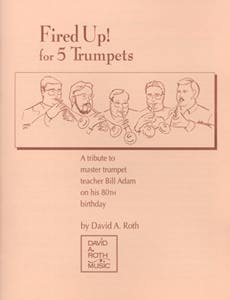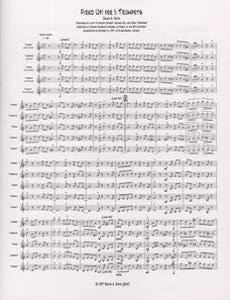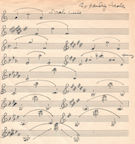Sheet Music
Fired Up! for 5 Trumpets by David A. Roth was written in honor of Mr. Adam's 80th Birthday. It premiered at the Bill Adam 80th Birthday Surprise Party held in Bloomington, Indiana, on October 25, 1997 by Charley Davis, Karl Sievers, Robert Baca, Pat Harbison and Barry Springer. The work is titled "Fired Up!" because this was an expression Mr. Adam often used to start a trumpet lesson: Let's get this thing fired up!
Technical Studies
These technical studies provide a basic foundation for trumpet playing. It doesn't matter if your focus is on orchestral, jazz or commercial music, all great trumpet players studied the fundamentals as students and continue to in their daily practice as professionals.
These books represent the core of what Mr. Adam used in trumpet lessons with his students. His approach in assigning these exercises was very individualistic so you will be well-advised to work with a skilled trumpet teacher hopefully who had lessons over an extended period of time with Mr. Adam. This will give you the maximum benefit.
Download a free PDF of Bill Adam's Expanding Scales written in his own handwriting.
Below are links to buy these books on Amazon. We are an Amazon affiliate and earn a small commission on these sales, which helps defray the cost of maintaining the site. Teachers should feel free to share a link to this page with their students.
The New Authentic Edition of Arban’s Complete Conservatory Method contains the tried and true comprehensive system of study that Arban developed over a century ago, and this completely re-engraved edition has been painstakingly edited by prominent trumpet performers and teachers.
In re-editing the method, the Arban system has been kept intact, while adding some of the editors’ insights with respect to how trumpet is taught today. Purists and modernists alike will welcome these new editions. Arban’s time-tested pedagogical sequence has also been given a fresh new layout for easier reading.
Contains an added bonus!
Herbert L. Clarke was an American cornet player and feature soloist. His book, Technical Studies for the Cornet is legendary and used daily by trumpet players all over the world.
Written by renowned teacher Max Schlossberg, this book is a collection of the exercises that Schlossberg wrote out for individual students. Along with the Arban and the Clarke, this is a must have for all trumpet players interested in technical studies. Used by schools, universities, conservatories and professionals the world over.
CC1004 The Art of Trumpet Playing. edited by Dr. Charles Colin. These exercises help develop a trumpet player's range.
The First Book of Practical Studies by Robert Getchell is a book full of simple and wonderful melodies. Each piece is musical and not very long. While it might appear to be a beginner's music book, it has also been used by advanced players to work on the areas of endurance, sight-singing, sight-reading and transposition. The melodies become gradually more challenging, but they move at a easy pace.
Here are some tips foR using this book for Endurance, Sight-singing, Sight-reading and transposition.
This is a sequel to Robert Getchell's First Book of Practical Studies. Book 2's melodies continue to be more challenging. Another benefit to using these two books is they prove a good framework to focus on improving a technical aspect of trumpet playing that needs improvement.
Here are some tips foR using this book for Articulations and Range.
Vannetelbosch offers a good collection of melodies to play that focus on musical expression. Each piece is a full page and doesn’t emphasize finishing on a high note.
This is a new edition by Roger Delmotte. There are 36 advanced etudes for trumpet, cornet, or flugelhorn. Composed by Theo Charlier (1868 - 1944), these are advanced melodies and are very popular among the top schools of music's trumpet majors. The melodies are longer than most etude books and are a good test of your endurance. As with many technical studies, it is best to work on them in sections until you can play them comfortabily before proceeding to a new section.
 Share
Share












